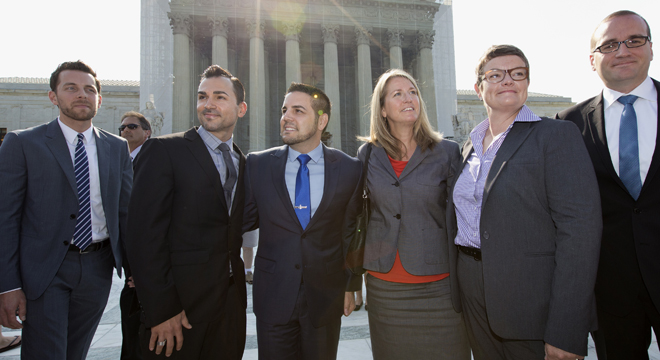The Supreme Court on Wednesday issued a ruling that has the effect of making same-sex marriage legal in California again but leaves intact bans in other states and avoided reaching the merits of whether gay marriage is constitutionally protected.
It’s a pyrrhic victory for marriage equality advocates because the Court did not recognize a constitutional right for same-sex couples to marry. Instead of settling the issue once and for all, the ruling on procedural grounds means the generational fight will continue in the states.
In a 5-4 decision written by Chief Justice John Roberts, the Court dismissed California’s Proposition 8 because the petitioners lacked standing, or the right to participate in the case. That means a lower court ruling that overturned the ban remains in effect. The outcome means other states remain free to allow or prohibit gay marriage, leaving intact the bans on gay marriage in dozens of states.
“Petitioners have no role — special or otherwise — in its enforcement. They therefore have no ‘personal stake’ in defending its enforcement that is distinguishable from the general interest of every California citizen,” Roberts wrote for the Court. “No matter how deeply committed petitioners may be to upholding Proposition 8, that is not a particularized interest sufficient to create a case or controversy under Article III.”
Roberts’ opinion was joined by Justices Antonin Scalia, Ruth Bader Ginsburg, Stephen Breyer and Elena Kegan — a mix of conservatives and liberals.
The case was dismissed because the five-justice majority decided that it wasn’t properly defended. The state of California refused to vouch for the law in court ever since it was adopted by the voters in 2008. That left the task to the group that spearheaded the ballot initiative, which the Supreme Court concluded wasn’t a proper party to the case.
Justice Anthony Kennedy filed a dissenting opinion — joined by Justice Clarence Thomas, Samuel Alito and Sonia Sotomayor dissented — arguing that the plaintiffs had standing.
“The Court’s opinion fails to abide by precedent and misapplies basic principles of justiciability,” Kennedy wrote. “Those errors necessitate this respectful dissent.”
The Proposition 8 case, Hollingsworth v. Perry, is particularly complicated because thousands of gay couples in California got married after the state Supreme Court validated gay marriage and before the ballot initiative against it was adopted by the voters in 2008. Part of the legal consideration was whether that right can be taken away once granted.
Support for marriage equality has risen dramatically across the country in recent years, particularly among younger Americans. National marriage equality is seen as inevitable if the trends keep up. But for now, the battles will have to be fought in individual states.






